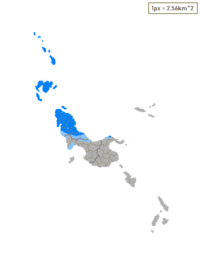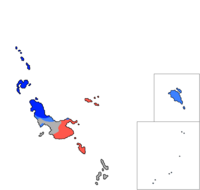Northern Ivili Language
This article is incomplete because it is pending further input from participants, or it is a work-in-progress by one author. Please comment on this article's talk page to share your input, comments and questions. Note: To contribute to this article, you may need to seek help from the author(s) of this page. |
| Northern Ivili | |
|---|---|
| Ekuşemīn Doneko Şotī | |
 | |
| Pronunciation | /ekuʃemaɪn ʃotaɪ/ |
| Native to | |
| Region | Şotīko Archipelago in Olivacia |
| Ethnicity | Stonish |
Native speakers | L1: 3,220,000+ (2018) L2: 3,335,000+ FL: 25,000+ |
Geonesian
| |
| Dialects |
|
| Official status | |
Official language in | |
Recognised minority language in | |
| Language codes | |
| ISO 639-1 | FS |
| ISO 639-2 | IVL |
| ISO 639-3 | – |
| Linguasphere | TBA |
 Distribution of the language throughout Flatstone
Absolute majority >50% of native speakers | |
The Northern Ivili language (Northern Ivili: Ekuşemīn Doneko Şotī) is a Geonesian language that is a part of the Ivili subgroup. Northern Ivili is the standard language of Flatstone, with as many as 6.6 million speakers across the entirety of Geonesia. The language is named after the Northern Ivili and Southern Ivili clans, which derived their names from an old proto-Ivili runic word meaning "hard." The language was standardized in 1911 by the Stonish crown and the prerevolutionary government and has universally served as the official language of Flatstone ever since.
History
TBA
Geographic distribution
TBA
Classification
TBA
Regional variants
Umudīn Dialect
Sunlenemo Dialect
Şotīgābonese
Phonology
Overview
Standard Ivili has traditionally operated under a Verb–subject–object word order (VSO), and this has been true for the entirety of the languages existence. It is also worth noting that in Ivili, Possession is typically ordered possessee before possessor. The Ivili language has five grammatical cases, and typically relies heavily on context to determine singularity, plurality, and depending on the sentence, tenses. Ivili has just seventeen phonemes, making the language the simplest of the four that are native to the Şotīko archipelago.
Alphabet
The transition from a Runic alphabet to a Latin script took place over the span of roughly a decade, likely beginning sometime in the mid nineteenth century. However, the Latin script wouldn't be officially adopted by the Kingdom of Flatstone until 1911, when it was standardized. Despite this, the Latin alphabet had risen in popularity on it's own, first being used en masse by the merchant class of Flatstone at the turn of the 19th century, and being spread through relatives via letters, newspaper articles, etc. Today, the Ivili alphabet consists of sixteen letters:
| Ā ā | B b | K k | D d | E e | G g | Ī ī | J j |
| L l | M m | N n | O o | P p | Ş ş | U u | V v |
It should also be mentioned that there are adaptations of the standard Northern Ivili phonology (Most notably in the Southern Ivili language) that include the voiced dental fricative ("ð"), and the voiceless alveolar plosive ("t") to compensate for the fact that some regional accents replace the pronunciation for the letter "J" in the Ivili alphabet with either of these three phonemes. However, this addition to the alphabet isn't federally standardized and is only recognized by a few localities.
| Order | 1 | 2 | 3 | 4 | 5 | 6 | 7 | 8 | 9 | 10 | 11 | 12 | 13 | 14 | 15 | 16 |
|---|---|---|---|---|---|---|---|---|---|---|---|---|---|---|---|---|
| Majuscule | Ā | B | K | D | E | G | Ī | J | L | M | N | O | P | Ş | U | V |
| Minuscule | ā | b | k | d | e | g | ī | j | l | m | n | o | p | ş | u | v |
| IPA Sound | e͡i | b | k | d | e~i | g | a͡i | j | l | m | n | o | p | ʃ | u | v |
Phonetics
| Labial | Alveolar | Palatal | Velar | |
|---|---|---|---|---|
| Plosive | p ⟨p⟩ b ⟨b⟩ |
t ⟨t⟩ d ⟨d⟩ |
k ⟨k⟩ ɡ ⟨g⟩ | |
| Fricative | v ⟨v⟩ | s ⟨s⟩ | ʃ ⟨ş⟩ | |
| Nasal | m ⟨m⟩ | n ⟨n⟩ | ||
| Approximant | l ⟨l⟩ | j ⟨j⟩ |
| Front | back | |
|---|---|---|
| Close | e~i ⟨e⟩ | u ⟨u⟩ |
| Close-mid | o ⟨o⟩ | |
| Open | a ⟨a⟩ | |
| Diphthongs | eɪ̯ ⟨ā⟩, aɪ̯⟨ī⟩ | |
Grammar
The Northern Ivili language has two grammatical numbers, the two being singular and plural. Northern Ivili has five grammatical cases:
Nouns
The Northern Ivili language has no rule for gender. However, the Northern Ivili language recognizes three genders; Male, female, and neuter. This is because traditionally in Flatstone these are the only three known genders, and gender is often determined by context in the Northern Ivili language. In the Northern Ivili language the adpositions typically comes before the noun, making prepositions standard.
- Grammatical numbers:
- Singular - unmarked
- Plural - unmarked
- Tenses:
- Present - unmarked
- Past - +Suffix "en"
- Future - +Prefix "dei"
Adjectives
In Northern Ivili, the adjective always comes after the noun.
